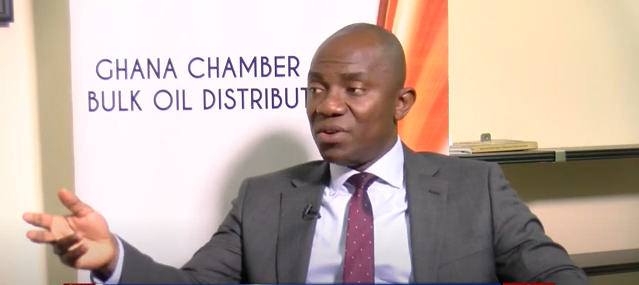
Audio By Carbonatix
The Chief Executive Officer of the Ghana Chamber of Bulk Oil Distributors, Dr. Patrick Kwaku Ofori, says the seemingly crowded Bulk Oil Distribution space is a phenomenon beyond the Chamber’s control.
According to him, while there have been concerns about the saturation of the BOD space despite Ghana being a small country, the Chamber does not have the power to regulate the space or issue licenses to players in the industry.
He stated that that power is within the remits of the National Petroleum Authority.
Speaking on JoyNews’ Business Edition, Dr. Ofori said the issue is more of a regulatory and policy directive and not one for the Chamber.
“We have a large membership and that is something that is beyond our control. Under normal circumstances you’d say that the bigger your membership, you’re likely to receive more in terms of subscription payment.
“But I’d be looking at it from a nationalistic perspective and what you’re saying about the numbers and how many of them are trading. How many of them are actually trading on a regular basis? And this something that is more about regulatory and policy directive.
“None of us sitting here are the ones who grants those licenses, neither are we the ones who are supposed to set the benchmark for enforcement of those licensing regimes and the requirements, and the kind of reporting and the standards that are expected from us. That falls within the regulator’s perspective or purview,” he said.
He noted that while some license holders do not actively participate in the BOD space, he’s optimistic that as the NPA develops new performance criteria it would help streamline the industry and provide the needed structures and policy framework for the development of the space.
“But what we are so happy about is that setting up a certain performance criteria that makes it so elaborate and then also conducive and that once you know that there are certain targets and certain advantages that exist for our membership or people who are doing the right thing to be able to leverage on.
“In that case, like you were saying, if we were let’s say 20 or 15 of the membership who have traded and have been supported to build the necessary reporting mechanism and the internal governance and regulatory requirements and structures by now we could have also had a local form of Trafis or the Glencores that would have been maybe exporting to other countries to also be earning the much needed forex that the country is in need of.
“So there are conversations going on about how they can streamline the sectors. But this is something that we as a Chamber cannot necessarily set the guidelines,” he said.
Latest Stories
-
Gun Amnesty: Greater Accra leads in weapons surrendered
35 minutes -
Dave Bishop outlines vision as he seeks Ghana Boxing Federation executive board position
41 minutes -
Former Ivory Coast coach Gasset dies
2 hours -
An Open Letter to the Deputy Attorney General, Dr Justice Srem-Sai
2 hours -
Humour at its finest at Kumasi Comedy Show
2 hours -
Police Christmas special operation: 101 suspects arrested in Greater Accra
2 hours -
15 arrested after sporadic shooting at Ho central mosque
3 hours -
GES condemns alleged theft of food supplies at Awaso STEM SHS
3 hours -
DopeNation electrifies crowd at Joy FM’s Party in the Park
3 hours -
Philip Ayesu emerges as the 2025 Achimota Champion after beating Percival Kwadjo Ampoma
3 hours -
Support your own – Mr P tells Ghanaian artistes
4 hours -
Ghana EXIM Bank develops 5-year export-led growth strategy to drive trade expansion
4 hours -
Big Smiles, Bigger Bounces: Kids take over the fun at the Joy Party in the Park
5 hours -
Joy FM Party in the Park 2025: Kwabena Kwabena takes centre stage
5 hours -
Ghana-Nigeria cyber-fraud network dupes over 200 victims of $400,000
5 hours

